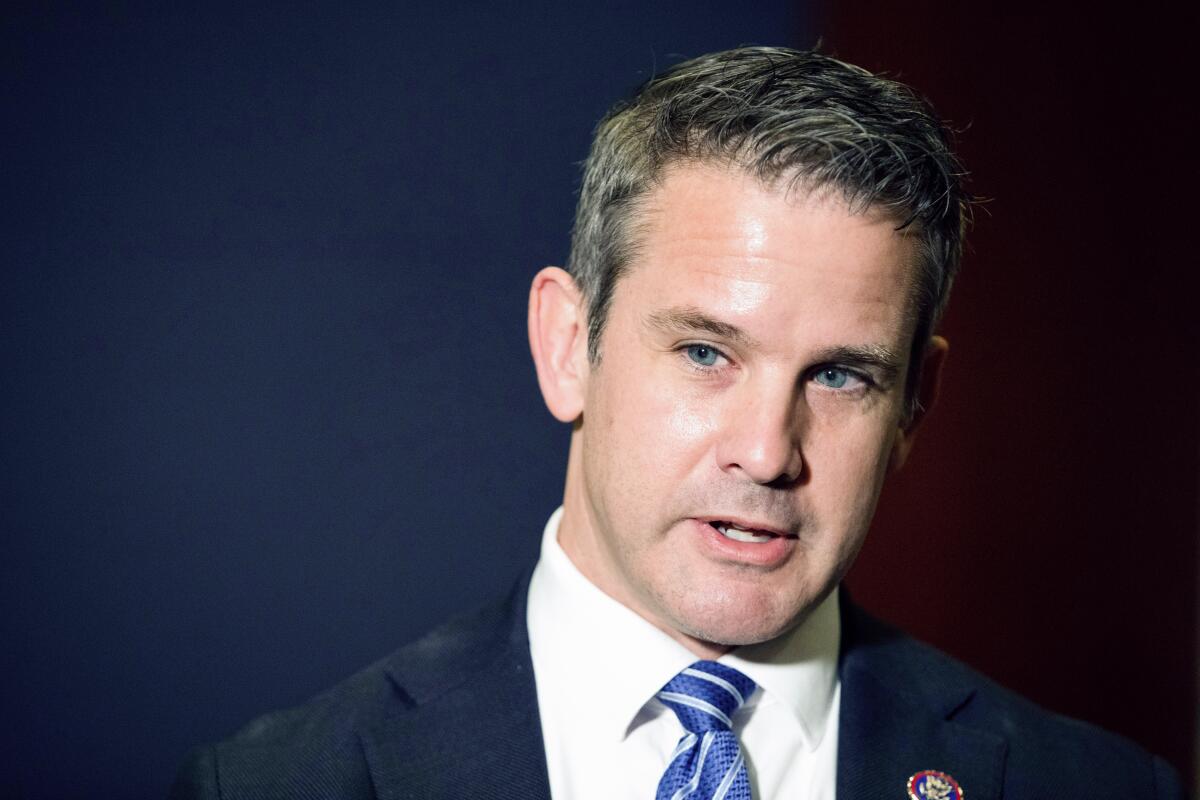Column: You can’t be a Republican if you won’t go along with the Big Lie

I first met Rep. Adam Kinzinger nearly 10 years ago at a time in which he was a rising star within the Republican Party. Not only was he in his early 30s and a natural on television, he went into the House with a good deal of gravitas, having served in the Air Force in both Operation Iraqi Freedom and Operation Enduring Freedom.
Over the years, we’ve discussed his views on social issues as well as his thoughts about President Obama’s military strategy. Sometimes I would agree with him, sometimes I would not. But regardless of whether we saw eye to eye on the topic, I always knew where he stood. That’s not to say Kinzinger didn’t play politics. You don’t get to serve six terms in Congress without your share of vague answers and long walks along the party line. But his core principles never changed — he is conservative on gun control, immigration and abortion.
He’s just no longer a Republican.
At least not by today’s standards.
Opinion Columnist
LZ Granderson
LZ Granderson writes about culture, politics, sports and navigating life in America.
Last week, he became the second Republican House member who voted to impeach President Trump to announce he was not seeking reelection in 2022. He joins Rep. Anthony Gonzalez (R-Ohio), a former college football and NFL star who also came into office with some cachet, only to see it evaporate as his party fell into Trumpism. In response to the Kinzinger news, Trump issued a statement that read in part: “2 down, 8 to go!”
It was like watching Thanos collect another infinity stone during “Avengers: Endgame.”
Consider this: The polling analysis website FiveThirtyEight has Kinzinger voting in support of Trump’s policies more than 90% of the time. He won the Republican primary in 2018 with 68% of the vote and went unopposed in the primary in 2020 and won the general election with more than 64% of the vote. Kinzinger even voted against the first impeachment in 2019. None of that seems to matter. He along with Gonzalez, Rep. Liz Cheney of Wyoming and a handful of others now find themselves out of favor with the party because they wouldn’t go along with Trump’s Big Lie.
Talk about what have you done for me lately.
“The Republican establishment now — whether it’s the [National Republican Congressional Committee], whether it’s Kevin McCarthy — have held onto Donald Trump,” Kinzinger said to ABC’s George Stephanopoulos on Sunday. “They have continued to breathe life into him, and so actually, it’s not really handing a win as much to Donald Trump as it is to the cancerous kind of lie and conspiracy — not just wing anymore — but mainstream argument of the Republican Party.”
Kinzinger was supported by the tea party insurgency that fueled the Republican landslide in the 2010 midterm election; it helped him defeat another Republican in the GOP primary in 2012. Those days of being a GOP darling are over.
“It’s not on Liz Cheney and I to save the Republican Party,” Kinzinger said. “It’s on the 190 Republicans who haven’t said a dang word about it, and they put their head in the sand and hope somebody else comes along and does something.”
Yeah, but what exactly?
There hasn’t been a consequential third-party candidate since Ross Perot received 19% of the popular vote in 1992. And while political analysts disproved the theory that Perot cost George H.W. Bush reelection, the truth remains that those 20 million votes Perot received did not go to Bush or Bill Clinton. Given the thin margin of victory in states such as Arizona and Georgia, how comfortable would Kinzinger be as a third-party candidate if his presence opens the door to a second Trump term?
And given Trump’s intense support among the GOP base — and continuing efforts by Republicans to sabotage voting laws — can anyone be sure that Trump won’t secure a second term, even without a third-party spoiler?
This is what makes Kinzinger’s departure so noteworthy. Over the course of one term, he went from rock star to GOP pariah all because he wouldn’t toss his core conservative values off a cliff.
In 2011, Kinzinger was listed on Time magazine’s “40 Under 40” list of future national leaders in American politics. Ten years later, Kinzinger is fulfilling that promise albeit not in the fashion he or the editors of the magazine imagined.
Kinzinger has said this is the end of his career in the House but not in politics. That could mean he’s eyeing a run for an Illinois Senate seat; both are currently held by Democrats. Sen. Richard J. Durbin will be close to 80 when he seeks reelection in 2026. But it’s doubtful Kinzinger will wait that long. Sen. Tammy Duckworth is up for reelection in 2022, but Kinzinger will have a hard time making it through the Republican primary with Trump still hanging over his shoulders.
Perhaps the governor’s office? Maybe president? Whatever Kinzinger decides to do next, one thing is crystal clear: Democrats won’t be his only opponents and facts won’t be much of an ally.
More to Read
A cure for the common opinion
Get thought-provoking perspectives with our weekly newsletter.
You may occasionally receive promotional content from the Los Angeles Times.












